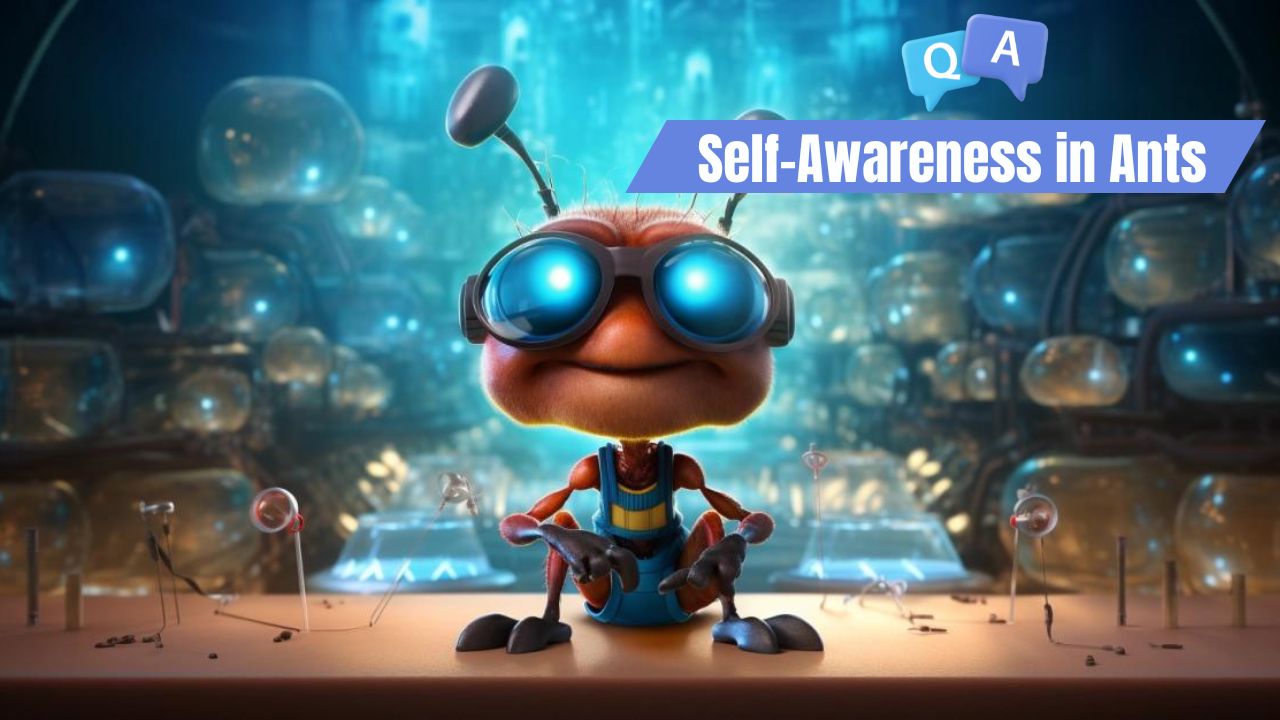TL;DR Summary
Ants display complex behaviors such as problem-solving, learning, and communication, which some might argue suggest a form of consciousness, but there is no concrete evidence that ants possess self-awareness as humans experience it. Their sophisticated behaviors are often geared towards survival and colony success, rather than individual recognition. Research into ant cognition is vital for ecological management and advances in technology but also poses significant philosophical questions about consciousness and ethical treatment across species. Ultimately, while ants may not be self-aware in the human sense, their actions reflect a highly developed level of organization and adaptability that continues to intrigue and inform scientific and philosophical discourse.
In the enthralling expanse of the natural world, the question of self-awareness in creatures big and small stirs a profound curiosity. As Professor Abigail Antenna, I am often asked about the inner lives of ants—whether these minuscule architects of Earth’s underbelly possess a glimmer of self-awareness. To embark on this journey of discovery, we must first delineate what self-awareness entails, peer into the realm of ant behavior and intelligence, and understand the significance of this inquiry.
Self-awareness, a trait often reserved for the animal kingdom’s most complex members, involves an individual’s ability to recognize themselves as distinct from their environment and others. But can such a sophisticated cognitive attribute be applied to ants?
Defining Self-Awareness
Self-awareness is traditionally characterized by an organism’s recognition of its own body and actions and, at higher levels, its thoughts and feelings. In humans, this is often tested through the mirror test or similar assessments that gauge an entity’s ability to recognize its own reflection. For ants, the definition and measurement of self-awareness must be attuned to their sensory and neurological capabilities, which differ vastly from our own.
Overview of Ant Behavior and Intelligence
Ant behavior is a mesmerizing dance of complexity and efficiency, driven by what appears to be a combination of instinctual programming and learned experience. Ants exhibit advanced communication systems, problem-solving abilities, and a division of labor—all signs of a collective intelligence that governs their societal structures. Yet, within this framework, can we find indications of individual cognition, or even the faintest spark of self-awareness?
Why the Question of Ant Self-Awareness Matters
Unraveling the threads of self-awareness in ants is more than an academic exercise; it holds the key to understanding consciousness itself. If ants possess a level of self-awareness, even fundamentally, it challenges our notions of consciousness and has implications for how we view and interact with all non-human life. It propels us to consider the ethical dimensions of our relationship with insects and the natural world and to ponder the evolutionary development of cognition across species.
As we delve deeper into the consciousness of ants, we may uncover more about the cognitive tapestry that binds all living creatures. Let us proceed with an open mind, ready to question and learn from the smallest of teachers—the ant.
Behavioral Indicators of Self-Awareness
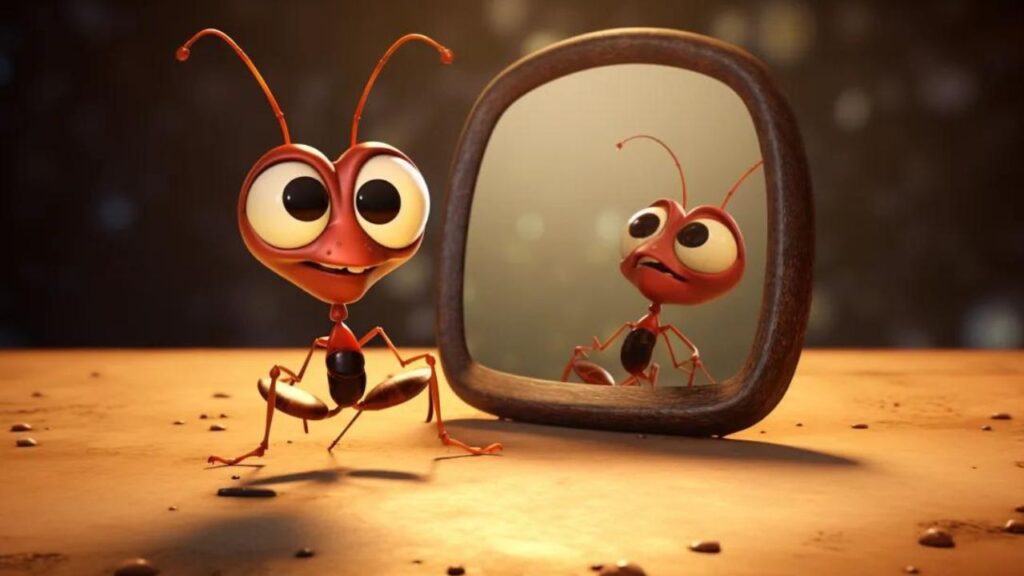
The search for self-awareness in ants requires a keen observation of their behaviors, discerning which actions might suggest individual cognition as opposed to the collective will. As we delve into their world, we search for those subtle indicators that could hint at an internal recognition of the ‘self’.
Individual Versus Collective Actions
Ant society is a paradigm of collective action, where each individual seems to operate as part of a larger organism—the colony. However, within these actions, there are nuanced behaviors that suggest individual decision-making. For instance, when faced with an obstacle, some ants will independently find a new path, while others continue to follow the established route. This suggests a level of individual assessment and choice-making, hinting at a rudimentary form of self-awareness that allows them to adapt to changing conditions.
Ants’ Responses to Mirrors and Mark Tests
The mirror test has long been used as a benchmark for self-awareness in animals, primarily in species known for their cognitive abilities like dolphins and great apes. While ants do not recognize themselves in mirrors as these animals do, they exhibit a range of behaviors when confronted with their reflections or marked with non-toxic paints. Some ants appear to investigate the marks, which could indicate a recognition that something has changed on their body, while others seem indifferent. These mixed results suggest that while ants may not possess self-awareness in the same way higher mammals might, they do engage with their environment and themselves in a way that warrants further investigation.
Learning and Memory in Ants
One of the cornerstones of self-awareness is the capacity for learning and memory, and ants demonstrate these abilities in various contexts. Ants can learn the location of food sources and the best paths to reach them, avoiding danger along the way. They can also remember potential threats and communicate this information to other colony members. Such learning and memory are essential for the survival of the individual ant and the colony, and while they don’t necessarily equate to self-awareness, they do show a level of cognitive processing that goes beyond mere instinct.
The quest to understand self-awareness in ants brings us to a crossroads of collective behavior and individual cognition. While clear indicators of self-awareness similar to humans’ have not been definitively observed in ants, their ability to learn, remember, and sometimes act independently suggests there’s more to their cognition than we might initially perceive. It’s a fascinating area of study that continues to challenge our understanding of consciousness in the animal kingdom.
Neurological Evidence of Self-Awareness in Ants
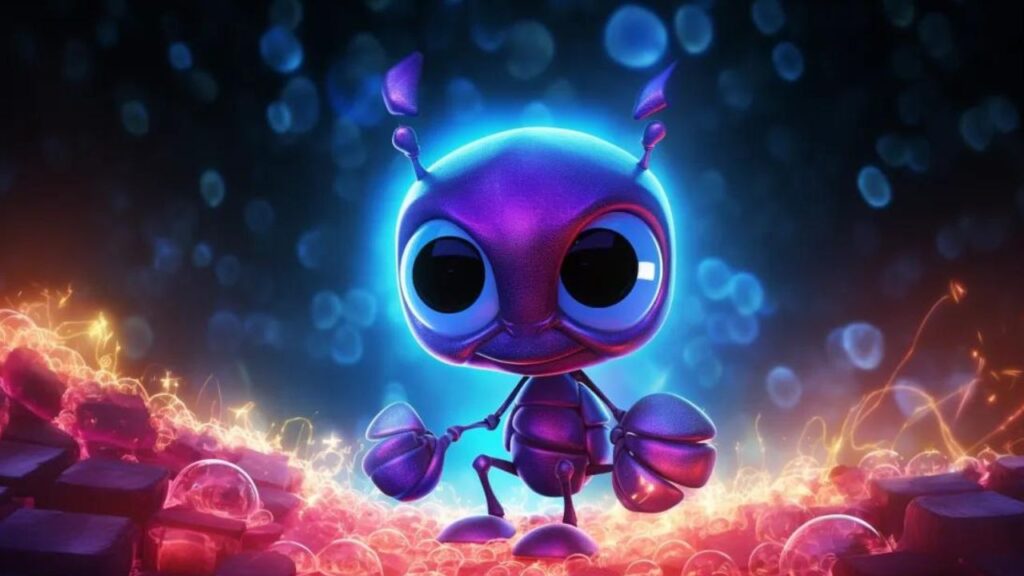
When venturing into the domain of neurological evidence for self-awareness in ants, we tread a fine line between observable brain function and the inferential leap to consciousness. The ant’s brain, though minuscule compared to that of larger animals, is a marvel of neural engineering, capable of commanding complex behaviors that are vital for the ant’s survival.
The Ant’s Brain: Structure and Function
The brain of an ant is a dense network of neurons, compact but efficient. It contains several lobes and processing centers that manage everything from olfactory signals to motor function. While the ant brain lacks the highly developed prefrontal cortex associated with decision-making in humans, it does possess mushroom bodies – structures involved in sensory processing and memory. These bodies are integral to learning and could be construed as a very basic form of self-awareness, allowing ants to navigate their environment with a learned map of landmarks and dangers.
Sensory Integration and Response
An ant’s brain must integrate a multitude of sensory inputs – chemical, tactile, visual, and more – to guide its actions. The ability of ants to process these inputs and respond in a coordinated manner suggests a level of sensory awareness necessary for interaction with the world. While this is not self-awareness in the existential sense, it does indicate a sophisticated level of neural processing that allows ants to distinguish between the self and the external world on a basic level.
Comparing Ant Cognition to Other Species
In comparison with other species, ant cognition is both unique and similar. For instance, while ants do not pass the mirror test like some birds and mammals, they do exhibit problem-solving skills and an ability to adapt to new information, much like octopuses and certain fish. These abilities suggest a shared evolutionary solution to environmental challenges – one that does not necessarily imply self-awareness but does indicate complex neural processing that can lead to seemingly intelligent behavior.
In the grand tapestry of neural evidence, while we cannot conclusively say ants possess self-awareness, their brains support a high level of sensory integration and response. This neural complexity allows for adaptive behaviors that can sometimes mimic what we might recognize as self-directed action, reminding us that consciousness and self-awareness may manifest in myriad forms across the animal kingdom.
Self-Awareness and the Social Structure of Ants
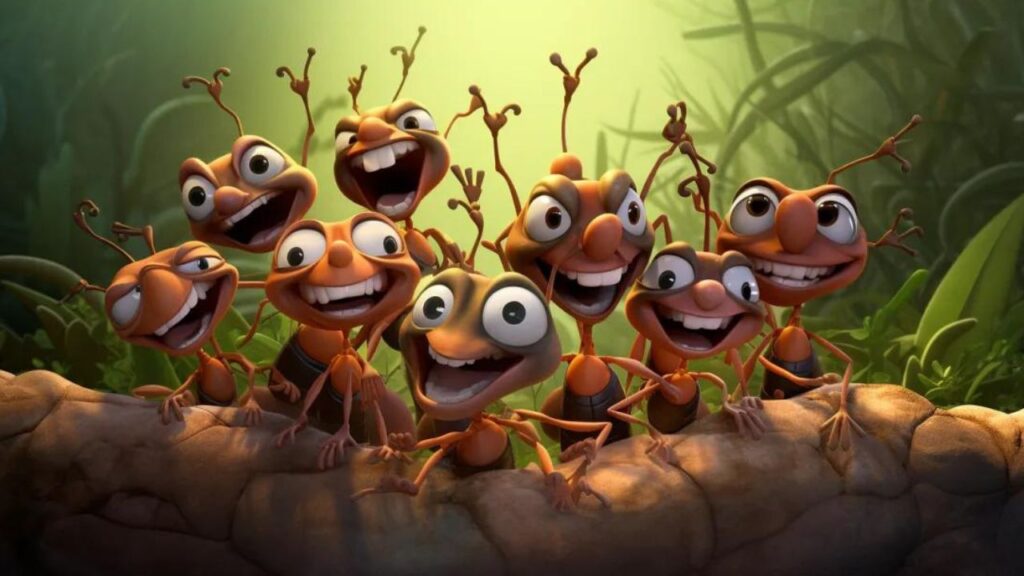
The social structure of ants is an intricate ballet of interdependence and coordination. Within this system, the role of the individual is often obscured by the overarching needs of the colony. Yet, the complex interactions and behaviors within the colony may provide glimpses into the cognitive world of ants and the possibility of a rudimentary form of self-awareness.
The Role of Individual Ants Within the Colony
Every ant in a colony has a specific role, be it forager, nurse, or queen, and these roles can change, indicating flexibility and adaptability in behavior. While individual ants seem to act as cogs in the larger machine of the colony, they also exhibit behaviors that suggest individual assessment and decision-making. For example, a forager ant may deviate from a well-trodden path to explore a new source of food, or a worker ant may choose to tend to a different task if the need arises. These behaviors imply a level of personal initiative that could be associated with a basic form of self-awareness.
Communication and Decision-Making
Ants communicate using a complex language of pheromones, which governs everything from foraging to defense. They make decisions based on collective input, yet there is evidence that individual ants can make independent decisions. For instance, when an ant finds food, it must decide whether the food is worth recruiting others to help gather it. This decision is based not just on predefined instinctual responses but also on an evaluation of the food’s quality and the situation’s context. Such decision-making processes might suggest a level of self-awareness, as the ant seems to be aware of its ability to influence the colony’s activities.
Altruism and Self-Sacrifice: Signs of Self-Awareness?
Altruism and self-sacrifice are behaviors commonly observed in ant colonies. When a colony is under attack, some ants will actively defend the nest, even at the cost of their own lives. This self-sacrifice is often viewed as a colony-level adaptation for survival, but it also raises questions about individual awareness. Does the sacrificing ant recognize its actions as self-destructive for the greater good? While this behavior is typically explained by the genetic drive to preserve the colony, which indirectly preserves the ant’s genetic material, it could also hint at a primitive awareness of the ‘self’ in relation to the ‘group.’
The relationship between self-awareness and the social structure of ants is complex. While the colony’s needs predominantly drive ants’ behaviors, there are moments where individual actions may suggest a form of self-awareness. These actions, whether they be independent decision-making or self-sacrificial for the colony’s benefit, open a window into the cognitive lives of ants, challenging us to reconsider our definitions of consciousness and self-awareness in the animal kingdom.
Research on Ant Cognition and Self-Perception
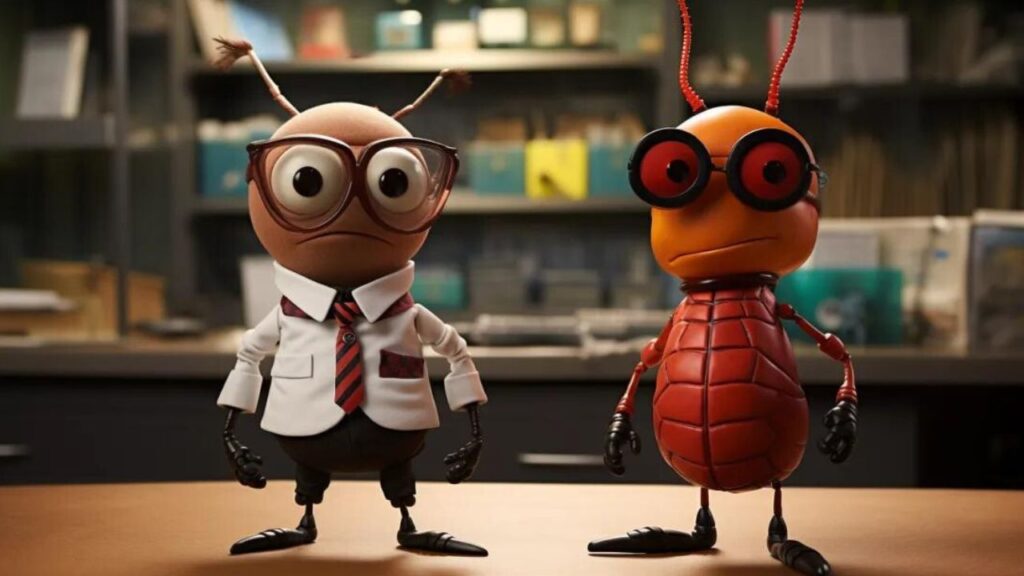
The cognitive world of ants, a subject of scientific fascination, has been probed and examined through various research methodologies. These studies aim to reveal the depths of ant intelligence and the potential for self-perception within these tiny creatures.
Experimental Approaches and Ethology
Experimental ethology, the study of animal behavior under natural or simulated conditions, has provided a wealth of information about ant cognition. Researchers have developed intricate experiments to test ants’ problem-solving abilities, memory, and communication. These experiments often involve mazes, puzzles, or tasks that ants must navigate or solve to reach a food source or return to their nest. Such setups help scientists understand how ants perceive their environment and themselves within it. By monitoring how ants react when confronted with their image or when navigating through complex terrain, researchers can infer the level of self-perception and awareness ants possess.
Key Findings from Ant Intelligence Studies
Studies on ant intelligence have uncovered that ants can learn from their experiences and even teach other ants through tandem running, where a knowledgeable ant will lead a naive ant to a food source. Ants have been shown to modify their behavior based on past encounters and communicate complex information using pheromones. Some research suggests ants can assess the quantity and evaluate the quality of food, indicating a higher level of cognitive processing. Additionally, ants have been observed to engage in behaviors that suggest a form of counting, as they keep track of steps or landmarks to gauge distances.
Implications for Understanding Insect Consciousness
The findings from these studies have profound implications for our understanding of insect consciousness. If ants can learn, teach, and make decisions based on complex stimuli, this could indicate a level of consciousness that extends beyond mere instinctive reaction. It compels us to consider the possibility of a spectrum of consciousness in which ants, and perhaps other insects, possess a form of awareness or self-perception that we have yet to fully comprehend. This opens up new perspectives on the ethical treatment of insects and the conservation of species that play crucial roles in their ecosystems.
Research into ant cognition and self-perception continues to challenge and expand our understanding of the mental lives of insects. As we uncover more about the capabilities of ants, we gain a greater appreciation for the cognitive intricacies that underlie the behaviors of one of the most successful and ubiquitous organisms on the planet.
Conclusion: Reflecting on the Nature of Ant Consciousness

As we draw the curtains on our exploration of ant cognition and the enigma of self-awareness, we find ourselves standing at the intersection of science and philosophy, reflecting on the profound complexities of consciousness in these diminutive yet remarkable creatures.
Summarizing the Debate on Ant Self-Awareness
The debate on ant self-awareness is a vibrant and ongoing one, teeming with differing opinions and interpretations. While definitive evidence of self-awareness in ants—as humans experience it—is elusive, there is an undeniable sophistication in ant behavior that pushes the boundaries of what we traditionally consider mere instinctual survival. Ants exhibit learning, problem-solving, and communication abilities that suggest a form of consciousness, though perhaps not self-awareness in the strictest sense. They navigate their world with an efficiency that implies a cognitive mapping of sorts, an understanding of ‘self’ in relation to their environment and their colony.
The Impact of Ant Cognition on Ecology and Science
The implications of ant cognition are vast and varied, influencing ecological dynamics and scientific thought. In ecology, ants play crucial roles as pollinators, seed dispersers, and bioindicators of environmental health. Understanding their cognitive abilities can lead to better conservation strategies and ecological interventions. In science, the study of ant cognition can inform artificial intelligence, particularly in the field of robotics, where ant-like algorithms are used to solve complex problems through collective behavior and simple rules.
Philosophical Implications of Insect Self-Awareness
The philosophical implications of insect self-awareness are profound. If ants possess a degree of consciousness, it challenges our perception of sentience and the criteria we use to judge the mental lives of non-human entities. It forces us to confront our ethical responsibilities towards insects and consider the rights of creatures that share our world yet experience it so differently.
In conclusion, while the question of whether ants are self-aware remains open, the journey to understand their consciousness has enriched our appreciation for the intricacies of life. Ants, through their complex behaviors and cognitive feats, remind us that consciousness may not be a human-centric phenomenon but a diverse, multi-faceted tapestry woven through the fabric of life itself. They encourage us to look beyond our biases and recognize the value and mystery inherent in all forms of cognition, no matter how small the bearer.

